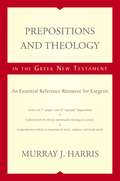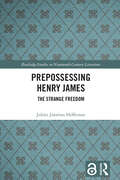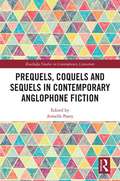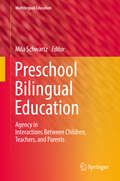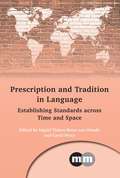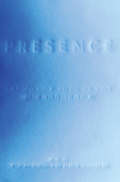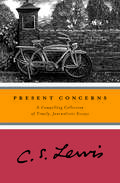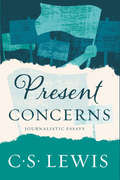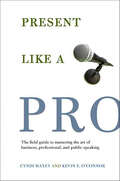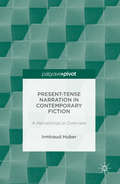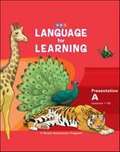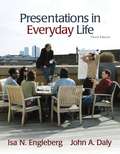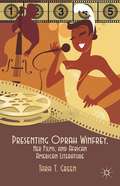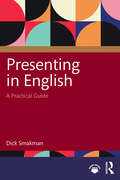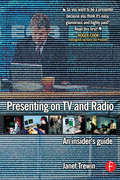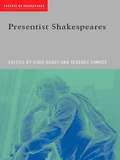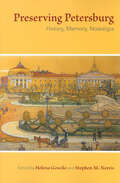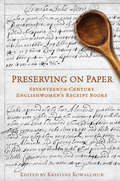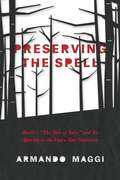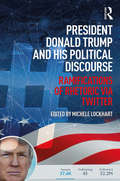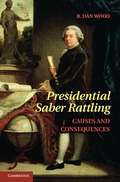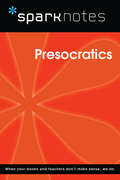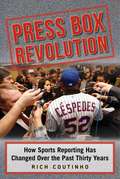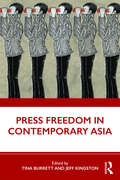- Table View
- List View
Prepositions and Theology in the Greek New Testament: An Essential Reference Resource for Exegesis
by Murray HarrisPrepositions are important in the exegesis of the Greek New Testament, but they are at the same time very slippery words because they can have so many nuances. While Prepositions and Theology in the Greek New Testament rejects the idea of a “theology of the prepositions,” it is a study of the numerous places in the Greek New Testament where prepositions contribute to the theological meaning of the text.Offered in the hope that it might encourage close study of the Greek text of the New Testament, its many features include the following:Coverage of all 17 “proper” and 42 “improper” prepositionsExplores both literary and broader theological contextsGreek font—not transliteration—used throughoutComprehensive indexes to hundreds of verses, subjects, and Greek wordsDiscussion of key repeated phrases that use a particular preposition
Prepossessing Henry James: The Strange Freedom (Routledge Studies in Nineteenth Century Literature)
by Julián Jiménez HeffernanThe novels of Henry James are filled with ghosts, but most of them escape dramatic treatment. These elusive specters are the voices of precursors that haunt his narratives, compromising their constitutive freedom. The Strange Freedom is an examination of the ways James’s fiction is prepossessed by some major voices of the English literary tradition: those of Shakespeare, Richardson, Fielding, Gibbon, Thackeray, and Dickens. This subtextual arrogation sets constrains to the unfolding, in James’s narratives, of liberal and romantic freedom—it places limits both to the absolute exemptions of aesthetic interest and to radical Bohemian abandon. But these constrains and limits can be regarded, dialectically, as the enabling conditions of the very liberty they imperil. Drawing on recent research on the spectral dynamics and indirections of literary influence by scholars like Adrian Poole, Philip Horne, Nicola Bradbury, Tamara Follini, and Peter Rawlings, but also on earlier deconstructive work by John Carlos Rowe, Prepossessing Henry James offers a speculative account of the way James is simultaneously resourced and restrained by his sources. Along the way, we discover how Hamlet’s ghost instills in James a fantasy of mental autonomy, or how he adapts Gibbon’s Enlightened narrative to inhibit civic liberty with images of female sacrifice. We see the governess in The Turn of the Screw possessed by the specter of Richardson’s Pamela, exposing social freedoms with liberal brutality. We encounter Gray, in The Ivory Tower, striving to obtain personal freedom by repressing Dickensian "figures, monstruous, fantastic." And, finally, we recognize how much The Ambassadors owes to the ambiguous manner of Thackeray.
Prequels, Coquels and Sequels in Contemporary Anglophone Fiction
by Armelle PareyThis book offers to delineate a key phenomenon in contemporary Anglophone fiction: novel expansion, when the plot and characters from a finished novel are retrieved to be developed in new adventures set before, after or during the narrative time of the source-text. If autographic and allographic sequels are almost as old as literature, prequels – that imagine the anteriority of a narrative – and coquels – that develop secondary characters in the same story time as the source-text – are more recent. The overall trend for novel expansion spread in the mid-1980s and 1990s and has since shown no sign of abating. This volume is organised following three types of relationships to the source-texts even if these occasionally combine to produce a more complex structure. This book comprises 11 essays, preceded by an introduction, that examine narrative strategies, aesthetic, ethical and political tendencies underlying these novel expansions. Following the overview provided in the introduction, the reader will find case studies of prequels, coquels and sequels before a final chapter that encompasses them all and more.
Preschool Bilingual Education: Agency In Interactions Between Children, Teachers, And Parents (Multilingual Education #25)
by Mila SchwartzThis volume provides an up-to-date collection of key aspects related to current preschool bilingual education research from a socio-linguistic perspective. The focus is on preschool bilingual education in multilingual Europe, which is characterized by diverse language models and children's linguistic backgrounds. The book explores the contemporary perspectives on early bilingual education in light of the threefold theoretical framework of child's, teachers', and parents' agencies in interaction in preschool bilingual education. Five significant theoretical concepts are promoted in this volume: the ecology of language learning, an educational partnership for bilingualism, a notion of agency in early language development and education, language-conducive contexts, and language-conducive strategies. The volume examines preschool bilingual education as embedded in specific socio-cultural contexts on the one hand and highlights its universal features on the other. The book is a fundamental read for scholars and students of second language teaching, preschool education, and bilingual education in multilingual and multicultural societies.
Prescription and Tradition in Language: Establishing Standards across Time and Space
by Carol Percy Ingrid Tieken-Boon van OstadeThis book contextualises case studies across a wide variety of languages and cultures, crystallising key interrelationships between linguistic standardisation and prescriptivism, and between ideas and practices. It focuses on different traditions of standardisation and prescription throughout the world and addresses questions such as how nationalistic idealisations of 'traditional' language persist (or shift) amid language change, linguistic variation and multilingualism. The volume explores issues of standardisation and the sociolinguistic phenomenon of prescription as a formative influence on the notional standard language as well as the interconnections between these in a wide range of geographical contexts. It balances the otherwise strong emphasis on English in English language publications on prescriptivism and breaks new ground with its multilingual approach across languages and nations. The book will appeal to scholars working within different linguistic traditions interested in questions relating to all aspects of standardisation and prescriptivism.
Presence: Philosophy, History, and Cultural Theory for the Twenty-First Century
by Ranjan Ghosh Ethan KleinbergThe philosophy of "presence" seeks to challenge current understandings of meaning and understanding. One can trace its origins back to Vico, Dilthey, and Heidegger, though its more immediate exponents include Jean-Luc Nancy, Hans Ulrich Gumbrecht, and such contemporary philosophers of history as Frank Ankersmit and Eelco Runia. The theoretical paradigm of presence conveys how the past is literally with us in the present in significant and material ways: Things we cannot touch nonetheless touch us. This makes presence a post-linguistic or post-discursive theory that challenges current understandings of "meaning" and "interpretation." Presence provides an overview of the concept and surveys both its weaknesses and its possible uses.In this book, Ethan Kleinberg and Ranjan Ghosh bring together an interdisciplinary group of contributors to explore the possibilities and limitations of presence from a variety of perspectives—history, sociology, literature, cultural theory, media studies, photography, memory, and political theory. The book features critical engagements with the presence paradigm within intellectual history, literary criticism, and the philosophy of history. In three original case studies, presence illuminates the relationships among photography, the past, memory, and the Other. What these diverse but overlapping essays have in common is a shared commitment to investigate the attempt to reconnect meaning with something "real" and to push the paradigm of presence beyond its current uses. The volume is thus an important intervention in the most fundamental debates within the humanities today.Contributors: Bill Ashcroft, University of New South Wales; Mark Bevir, University of California, Berkeley; Susan A. Crane, University of Arizona; Ranjan Ghosh, University of North Bengal; Suman Gupta, Open University Ethan Kleinberg, Wesleyan University; John Michael, University of Rochester; Vincent P. Pecora, University of Utah; Roger I. Simon.
Present Concerns
by C. S. LewisNineteen essays on democratic values, threats to educational and spiritual fulfillment, literary censorship, and other topics all displaying Lewis's characteristic sanity and persuasiveness. Introduction by Walter Hooper.
Present Concerns: Journalistic Essays
by C. S. LewisA repackaged edition of the revered author’s essays in which he deliberates on contemporary issues, from the moral to the spiritual to the practical.C. S. Lewis—the great British writer, scholar, lay theologian, broadcaster, Christian apologist, and bestselling author of Mere Christianity, The Screwtape Letters, The Great Divorce, The Chronicles of Narnia, and many other beloved classics—was one of the foremost religious philosophers of the twentieth century; a thinker whose far-reaching influence on Christianity continues to be felt today.Demonstrating Lewis’s wide range of interests, Present Concerns includes nineteen essays that reveal his thoughts about democratic values, threats to educational and spiritual fulfillment, literary censorship, and other timely topics, offering invaluable wisdom for our own times.
Present Like a Pro: The Field Guide to Mastering the Art of Business, Professional, and Public Speaking
by Cyndi Maxey Kevin E. O'ConnorImprove your speaking skills today with this carry-along coach written by two of the top professionals in the fieldSales calls. Weddings. Business conferences. Weekly meetings. We're all called on to speak in public. Often, professional success and advancement depend on it. Yet many people find the experience draining or terrifying, or remain unsatisfied with their own ability to engage and sway an audience. In Present Like a Pro, you'll learn how to:· Solicit useful feedback.· Deal with hecklers.· Gracefully handle A/V malfunctions.· Sell your point through audience participation.· Evoke the power of your own life in your talk.· And much more!Kevin E. O'Connor and Cyndi Maxey have distilled the knowledge they've acquired from more than forty-five years combined of professional speaking into a concise, easy-to-use guide that will help anyone Present Like a Pro!
Present Tense Narration in Contemporary Fiction
by Irmtraud HuberIn this book, Irmtraud Huber considers a wide range of contemporary novels to explore the variety of possibilities and effects of the use of the present tense, as well as investigating the reasons for its popularity. By illustrating the complexity and sophistication of four different types of contemporary usage, Huber's discussion goes some way towards refuting those critical voices which consider present-tense narration a passing fad and stylistic affectation. As a tense of narration, the present can serve to tell different stories than the past tense, or can tell them differently. By no means a passing fad, it is an important characteristic of contemporary literature.
Presentation Book A [Kindergarten]
by Meryl Henderson David Groff Kersti FrigellNIMAC-sourced textbook
Presentation Book C [Kindergarten]
by David Groff Kersti Frigell Janet BenhamNIMAC-sourced textbook
Presentations in Everyday Life: Strategies for Effective Speaking (3rd Edition)
by John A. Daly Isa N. EnglebergPresentations in Everyday Life responds to the expressed needs of those who face the challenge of making presentations that inform, persuade, entertain, and inspire audience members. Through hands-on materials and practical advice,Presentations in Everyday Life uniquely offers the seven key elements and guiding principles of presentation speaking that apply to any speaking context. Readers will learn immediately useful strategies and skills to make their presentations more successful and memorable.
Presenting Oprah Winfrey, Her Films, and African American Literature
by Tara T. GreenOprah Winfrey has long promoted black issues by being involved as a producer or actor in the adaptation of works by African American writers for film. This volume evaluates Winfrey's involvement in the visual interpretation of African American literary texts using film, music, black masculinity, black feminist, and cultural theory.
Presenting in English: A Practical Guide
by Dick SmakmanThis practical guide introduces students to the language and other skills needed to deliver a presentation in English. Concise and accessible, the guide will be particularly helpful to learners of English.The book: covers different types of presentations, including group and online presentations, common structures of presentations, presentation tools, and the main message that each presentation should have introduces the language skills necessary for presentations: useful English words, phrases, and sentences to use in the various parts of presentations, and how one’s pronunciation can become clearer to an international audience explains how to control voice and vocal tract usage and how to effectively use the body as a communicator discusses how to communicate with the audience, including how to handle questions, and explores different types of audiences includes culturally diverse examples, case studies, and exercises Accompanied by online support material with recordings, the book is an essential guide to delivering a successful presentation in English.
Presenting on TV and Radio: An insider's guide
by Janet TrewinAspiring radio and TV presenters will benefit from the informative and entertaining guidance provided by accomplished presenter, Janet Trewin. Presenting on TV and Radio is packed with illustrations, practical exercises and insider tips for improving your presentation skills and breaking into this competitive industry. Based on the principle that all successful presentation on TV and radio is dependent on uniform skills applicable to both mediums, the book begins by explaining basics such as appearance, authority, body language, diction, scriptwriting, deadlines, technology and working with a co-presenter. Valuable insights into key employment issues such as sexism, ageism, racism and disability are also offered. The different requirements of TV and radio presentation are then examined, focusing on each specialist area in detail and with tips from professionals in the business. These include: presenting news in the studio as an anchor and as a reporter on the road; current affairs and features involving live and recorded material; DJ'ing; light entertainment (e.g. game shows and personality programmes); sports presentation; children's programmes; foreign broadcasters and those broadcasting to worldwide audiences.
Presentist Shakespeares (Accents on Shakespeare)
by Hugh Grady Terence HawkesPresentist Shakespeares is the first extended study of the principles and practice of 'presentism', a critical movement that takes account of the never-ending dialogue between past and present. In this bold and consistently thought-provoking collection of presentist readings, the contributors: argue that the ironies generated by our involvement in time are a fruitful, necessary and an unavoidable aspect of any text's being, and that presentism allows us to engage with them more fully and productively demonstrate how these ironies can function as agents of change, flowing unstoppably back into the events of the past, colouring how we perceive them and modifying our sense of what they signify show that a critic's inability to step beyond time and specifically the present does not, as has been argued elsewhere, 'contaminate' readings of Shakespeare's plays, but rather points to shades of implication suddenly available here and now within the wide range of plays examined suggest that presentism might not merely challenge or expand our sense of what Shakespeare's plays are able to tell us, but may in fact offer the only effective purchase on these texts that is available to us. Presentist criticism is an open-ended and on-going project, located at a particularly interesting and demanding juncture in modern Shakespeare studies. At this crucial point, then, Presentist Shakespeares is a compelling collection of readings by a distinguished team of authors, but it is also much more: it is a landmark, which reflects, develops and even rejoices in the intedeterminacy of the field. Contributors include: Catherine Belsey, Michael Bristol, Linda Charnes, John Drakakis, Ewan Fernie, Evelyn Gajowski, Hugh Grady, Terence Hawkes and Kiernan Ryan.
Preserving Petersburg: History, Memory, Nostalgia
by Helena Goscilo and Stephen M. Norris“Goscilo and Norris’ innovative anthology provides Slavic scholars with a panoramic view of the city’s literary, pictorial and social manifestations.” —Europe-Asia StudiesFor more than three centuries, St. Petersburg, founded in 1703 by Peter the Great as Russia’s westward-oriented capital and as a visually stunning showcase of Russia’s imperial ambitions, has been the country’s most mythologized city. Like a museum piece, it has functioned as a site for preservation, a literal and imaginative place where Russians can commune with idealized pasts. Preserving Petersburg represents a significant departure from traditional representations. By moving beyond the “Petersburg text” created by canonized writers and artists, the contributors to this engrossing volume trace the ways in which St. Petersburg has become a “museum piece,” embodying history, nostalgia, and recourse to memories of the past. The essays in this attractively illustrated volume trace a process of preservation that stretches back nearly three centuries, as manifest in the works of noted historians, poets, novelists, artists, architects, filmmakers, and dramatists.“The collection truly sparkles as the contributors each in turn take up this snuff box of a city . . . and breathe movement and life into the idealized Petersburg museum.” —Gregory Stroud, Bennington College“This collection brings together history, literature, architecture, and the politics of memory.” —Choice“An interesting and important contribution to existing scholarship on St. Petersburg’s myth, cult, and text . . . this volume is distinctive.” —Catharine Theimer Nepomnyashchy, Columbia University“A truly innovative contribution to the scholarship on Petersburg . . . The volume should be read by all serious Slavic scholars.” —Emily Johnson, University of Oklahoma
Preserving on Paper: Seventeenth-Century Englishwomen's Receipt Books
by Kristine KowalchukApricot wine and stewed calf’s head, melancholy medicine and "ointment of roses." Welcome to the cookbook Shakespeare would have recognized. Preserving on Paper is a critical edition of three seventeenth-century receipt books–handwritten manuals that included a combination of culinary recipes, medical remedies, and household tips which documented the work of women at home. Kristine Kowalchuk argues that receipt books served as a form of folk writing, where knowledge was shared and passed between generations. These texts played an important role in the history of women’s writing and literacy and contributed greatly to issues of authorship, authority, and book history. Kowalchuk’s revelatory interdisciplinary study offers unique insights into early modern women’s writings and the original sharing economy.
Preserving the Spell: Basile's "The Tale of Tales" and Its Afterlife in the Fairy-Tale Tradition
by Armando MaggiFairy tales are supposed to be magical, surprising, and exhilarating, an enchanting counterpoint to everyday life that nonetheless helps us understand and deal with the anxieties of that life. Today, however, fairy tales are far from marvelous—in the hands of Hollywood, they have been stripped of their power, offering little but formulaic narratives and tame surprises. If we want to rediscover the power of fairy tales—as Armando Maggi thinks we should—we need to discover a new mythic lens, a new way of approaching and understanding, and thus re-creating, the transformative potential of these stories. In Preserving the Spell, Maggi argues that the first step is to understand the history of the various traditions of oral and written narrative that together created the fairy tales we know today. He begins his exploration with the ur-text of European fairy tales, Giambattista Basile’s The Tale of Tales, then traces its path through later Italian, French, English, and German traditions, with particular emphasis on the Grimm Brothers’ adaptations of the tales, which are included in the first-ever English translation in an appendix. Carrying his story into the twentieth century, Maggi mounts a powerful argument for freeing fairy tales from their bland contemporary forms, and reinvigorating our belief that we still can find new, powerfully transformative ways of telling these stories.
President Donald Trump and His Political Discourse: Ramifications of Rhetoric via Twitter
by Michele LockhartPresident Donald Trump and His Political Discourse brings together a diverse collection of perspectives on President Trump’s Twitter rhetoric. Truly unique in its in-depth exploration, the volume demonstrates the ways in which international and U.S. relations, media and "fake news," and marginalized groups, among other things, have been the subject of President Trump’s tweets. It also features qualitative–quantitative analyses, evaluating tweet patterns, broader language shifts, and the psychology of President Trump’s Twitter voice. The purpose of this collection is not only to analyze the language used but also to consider the ramifications of the various messages on both individual and global levels, for which Trump is both celebrated and criticized. Interdisciplinary in approach, this collection is a useful resource for students in political rhetoric and communication, international relations, linguistics, journalism, leadership studies, and more.
Presidential Saber Rattling
by B. Dan WoodThe founders of the American republic believed presidents should be wise and virtuous statesmen consistently advocating community interests when conducting American foreign policy. Yet the most common theoretical model used today for explaining the behavior of politicians is grounded in self-interest, rather than community interest. This book investigates whether past presidents acted as noble statesmen or were driven by such self-interested motivations as re-election, passion, partisanship, media frenzy and increasing domestic support. The book also examines the consequences for the nation of presidential behavior driven by self-interest. Between 1945 and 2008, presidents issued 4,269 threats to nineteen different countries. Professor B. Dan Wood evaluates the causes and consequences of these threats, revealing the nature of presidential foreign policy representation and its consistency with the founding fathers' intentions.
Presocratics (SparkNotes Philosophy Guide)
by SparkNotesPresocratics (SparkNotes Philosophy Guide) Making the reading experience fun! SparkNotes Philosophy Guides are one-stop guides to the great works of philosophy–masterpieces that stand at the foundations of Western thought. Inside each Philosophy Guide you&’ll find insightful overviews of great philosophical works of the Western world.
Press Box Revolution: How Sports Reporting Has Changed Over the Past Thirty Years
by Rich CoutinhoPress Box Revolution is a journey through the evolution of reporting in New York and around the nation by a reporter who has witnessed every second of it in the past three decades. Rich Coutinho, a New York-based reporter who has covered numerous major sporting events, will escort readers into corners of the press box and locker room they have never seen and discusses what the business will look like down the road. Coutinho gives an insider’s view of the evolving technology in the business, the growth of women in sports creating much needed diversity in the reporting landscape, the emergence of sports talk radio and the Internet, as well as the personalities on the New York sports scene that make it so challenging to cover. Press Box Revolution lifts the curtain on all the myths about how sports is reported and it will help fans realistically evaluate the information they read and hear that is labeled "Breaking News” or "Insider Report.” It is a must-read for all well-informed fans and aspiring sports journalists.
Press Freedom in Contemporary Asia
by Jeff Kingston Tina BurrettThis book analyzes the constraints on press freedom and the ways in which independent reporting and reporters are at risk in contemporary Asia to provide a barometer of democratic development in the region. Based on in-depth country case studies written by academics and journalists, and some who straddle both professions, from across the region, this book explores the roles of mainstream and online media, and how they are subject to abuse by the state and vested interests. Specific country chapters provide up-to-date information on Bangladesh, Kashmir, Malaysia, Myanmar, Nepal, Pakistan, Sri Lanka, Taiwan, Thailand and Vietnam, as well as on growing populist and nationalist challenges to media freedom in the Philippines, India, Indonesia and Japan. The book includes a theoretical chapter pulling together trends and common constraints facing newsrooms across Asia and a regional overview on the impact of social media. Three chapters on China provide insights into the country’s tightening information environment under President Xi Jinping. Moreover, the legal environment of the media, political and external pressures, economic considerations, audience support and journalists’ standards and ethics are explored. As an international and interdisciplinary study, this book will appeal to undergraduates, graduates and scholars engaged in human rights, media studies, democratization, authoritarianism and Asian Studies, as well as Asia specialists, journalists, legal scholars, historians and political scientists.
